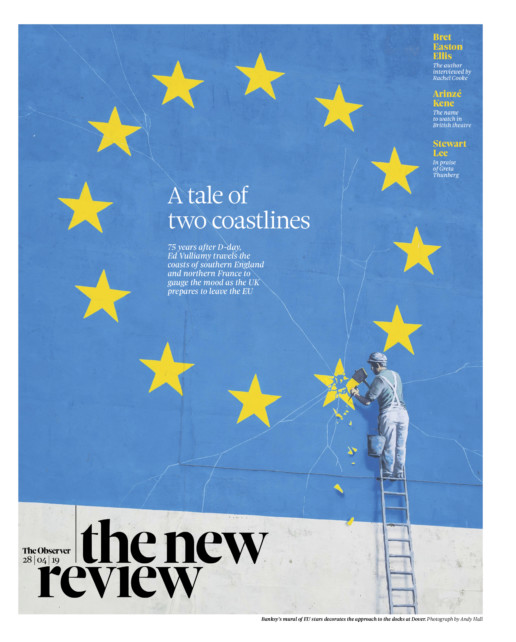
Ed Vulliamy
“A tale of two coastlines”
The New Review – The Observer
Voices from across the divide
On the eve of D-day’s 75th anniversary, as the reality of our departure from the EU looms, how do those on either side of the channel feel? Ed Vulliamy decided to find out, travelling both coasts with Le Monde journalist Rémy Ourdan
The French view, by Rémy Ourdan of Le Monde
Ed Vulliamy and I travelled to Normandy twice last year. The first time was in June, around the time of the D-day commemorations, for a conference on the Bosnian war – a conflict we both covered 25 years ago – at the Memorial Museum in Caen. The second time was in October for the Bayeux awards for war correspondents. It was then, at the bar of the famous Lion d’Or hotel, where both De Gaulle and Churchill had come during or after the second world war, that Ed suggested we visit the Channel coasts together before Brexit. The idea was to travel both coasts in search of what, over centuries, has brought the two countries closer, and what drives them apart. We travelled, one could say, between the historical bookends of William the Conqueror and D-day.
Two battles – Hastings in 1066 and Normandy in 1944 – that changed for ever the destinies of the two countries, and, in the case of the latter, the destiny of the world. Two landings also both on the news agenda: 1066 with President Macron’s promise to loan the Bayeux Tapestry to England after the rupture of Brexit, and 1944 with the 75th anniversary of D-day on 6 June.
We visited historians, museum directors, geographers, writers, and people more concerned by recent history and current affairs such as port administrators, fishermen, rock singers and football fans. We listened to stories about centuries of war and hatred, from anglophiles on the French coast and francophiles on the British one. We met French-British families, for whom Brexit is a tragedy, regardless of whether they feel “European”, and those with both pro and anti-Brexit views on England’s south coast.
People living on both coasts talk about the age-old enemy and shared history, but the conclusion of the trip might be that they don’t really know each other, or don’t really care about each other.
The articles in Le Monde were published two weeks ago, on 11 and 12 April, as a series. 12 April was one of the deadlines for Brexit, ultimately postponed again. In Paris, where very few people would know about 1066 or the hundred years war, readers were impressed with how local and family memories in Normandy could still invoke centuries-old conflicting stories.
French readers wrote to me saying they never thought about the 20,000 civilian casualties of the Battle of Normandy in 1944, killed by the British and American liberators of Europe – a kind of taboo in France, but a memory still very much alive from Caen to Le Havre.
This trip reminded us that whether one is pro or anti-Brexit, pro or anti-European Union (and some of the French people we met would for sure be “Frexiters” if they had the chance), that shared history is a centuries-long process.
However passionate people in the UK are today about Brexit, Nathalie and Mark Worthington, a French-British couple who both curate second world war museums in Normandy, told us, while walking in the Ranville war cemetery (where lie the British soldiers killed during the capture of Pegasus Bridge, a few hours before the D-day landing): “When we are angry or when we simply have a bad day, we come to take a walk here, between the first soldiers killed for the liberation of Europe. We will never live through worse than what they lived through.”